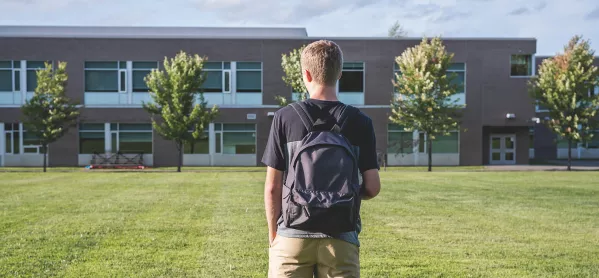- Home
- Nearly half of exam students ‘not given lockdown work’
Nearly half of exam students ‘not given lockdown work’

Almost half of this year’s GCSE and A-level candidates did not have any work assigned to them after school closures - compared with “almost all” Year 10 and 12 pupils who received work from their teachers, according to new research.
And disadvantaged pupils, in particular, who are going into sixth form or college next year following a six-month gap in their education are going to need “more support than ever”, say researchers at the National Foundation for Education Research (NFER).
An NFER report published today cites exam cancellations as the main reason for work not being provided, but says there have been “missed opportunities” to learn content and consolidate knowledge through revision. It states that, on return to the classroom this September, pupils may find it “challenging” to engage with the next stage of their education, especially if in a new setting.
Exclusive: Covid-19 ‘widens achievement gap to a gulf’
Closing the gap: Lockdown’s challenge for teachers
Coronavirus: DfE lockdown help for poorer pupils ‘has little impact’
Jack Worth, lead economist at NFER, said: “It is particularly concerning that so many Year 11 and 13 pupils spent little or no time engaging in learning activities.
“From September, these young people, particularly those from disadvantaged backgrounds, will need more support than ever after what will have been a six-month gap in their education.”
The findings come as Tes runs a series of articles investigating the widening gap in attainment between disadvantaged pupils and their peers under lockdown, which analysts say could have widened by as much as 75 per cent.
The research, carried out at the end of April among more than 4,000 parents, reveals that more than 94 per cent of primary and key stage 3 pupils were receiving work from teachers compared to only three-quarters of those in key stage 4 and key stage 5.
Kevin Courtney, joint-general secretary of the NEU teaching union, said: “The Department for Education has displayed a curious silence around how schools are supposed to be able to provide enough targeted support, and address the amount of learning time missed.
“We think government could be doing much more to make targeted support possible, which requires small class sizes and groups, additional teachers and a flexible curriculum. All of this is essential as many students will need much more individual attention on their return.”
The report also states that the government’s plan to impose fines on parents for pupils’ non-attendance from September may be “counterproductive” because a quarter of pupils live with an adult at high or very high risk of serious illness related to Covid-19.
Instead, the report states it would be better to delay the enforcement of fines until community infection rates are lower as well as possibly introducing additional safety measures for some pupils, while also recognising that remote or hybrid learning may need to continue for some pupils.
Other findings were that:
- Parents from the lowest-income households spent the most amount of time supporting their child with school work, but pupils from higher-income households, and whose parents had higher levels of education, spent the most time on school work at home, particularly at secondary level.
- Parental education was largely unrelated to the amount of time parents spent helping with their child’s school work
- Offline lessons such as worksheets or recorded video were much more frequent then online lessons
A Department for Education spokesperson said: “We know being in school is vital for children’s education and wellbeing, which is why we have announced that all pupils should return to the classroom from September.
“We’re targeting support in the areas that need it most to make sure no child falls behind as a result of coronavirus, including providing over 200,000 laptops and tablets for vulnerable and disadvantaged children, and launching our £1 billion Covid catch up fund to directly tackle the impact of lost teaching time.
“Students who were due to sit exams this year will receive a calculated grade that enables them to progress to the next stage of their education or training, as they have in previous years.”
Keep reading for just £1 per month
You've reached your limit of free articles this month. Subscribe for £1 per month for three months and get:
- Unlimited access to all Tes magazine content
- Exclusive subscriber-only stories
- Award-winning email newsletters



